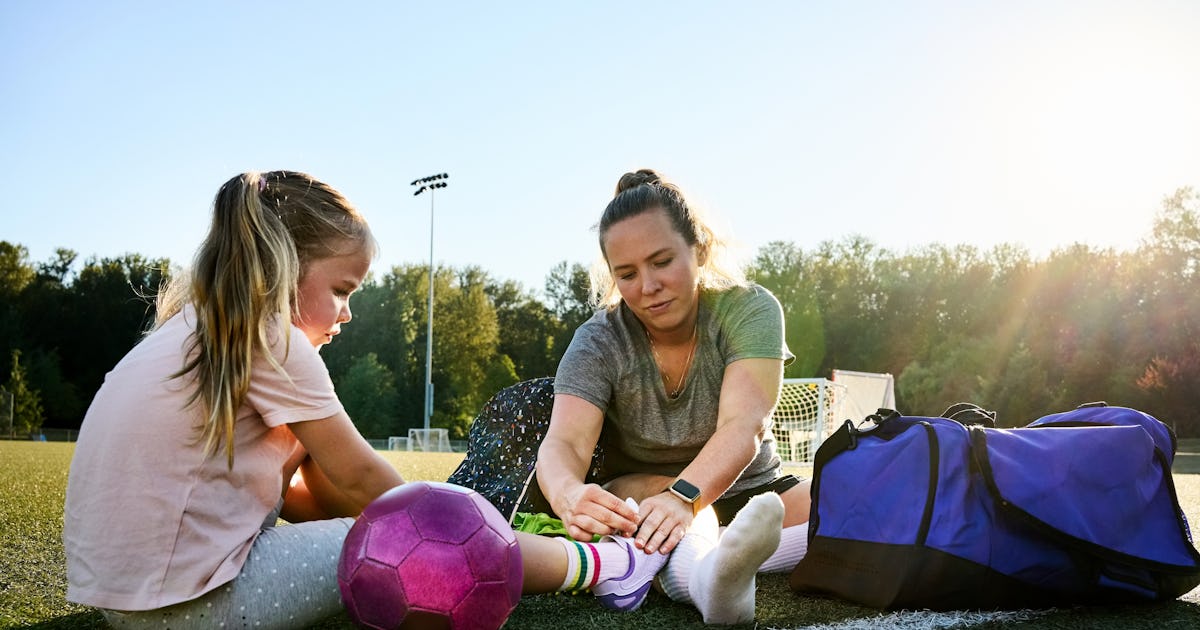School is back in session, which means extracurriculars are kicking back into high gear, too. Band, sports, theater, clubs — your kid has so many interests and passions, it’s hard to decide what to choose. But if you’re constantly out of the house, driving between school, practice, and home, it’s easy to start wondering if you’re doing too much, especially if your kid seems completely wrung out each night at the dinner table. (Can kids get burnt out? They seem burnt out…)
We asked pediatricians and children’s therapists if we, as a collective, are over-scheduling our kids these days, why it matters that we strike the right balance, and, more importantly, how to do just that.
Are we over-scheduling our kids?
Kaila Hattis, LMFT, therapist and owner of Pacific Coast Therapy, says she sees many kids come through her practice who “attend close to 30 hours in school and 15 hours in organized programs” each week. “Parents spend hundreds of dollars on their activities every month, and the children go to therapy tired, grumpy, and not connected to their interests.”
“Many children today are living at a pace like busy adults. School fills much of their day, and when you add sports, music lessons, and tutoring, there is often little room left for rest or play. Overscheduling is increasingly common, and it carries emotional and developmental costs,” says Dr. Ayesha Ludhani, a licensed psychologist specializing in therapy for children, teens, and parents.
Kids today are enrolled in more structured activities than in previous generations, so it’s a valid concern, says Dr. Samira Armin, a pediatrician at Texas Children’s Pediatrics and a mom with kids in middle and high school. Those activities often happen after they’ve been in school for six to seven hours, and possibly before- or after-school care programs as well. She says it’s hard to say whether the average child is over-scheduled because it varies so much by what each child can handle. However, there are ways to tell if your child’s schedule is too much for them.
What happens when we don’t give our kids enough unstructured time? Can kids get burnt out?
Soccer practice, piano lessons, rehearsals, they all teach our children valuable lessons and skills they can use for life… but the opportunity to decompress and be bored matters too, experts say. Free time is “when the brain does some of its best work,” Ludhani says. “Neuroscience shows that when children are not actively directed by adults or structure, their brain engages the default mode. This state helps with creativity, problem-solving, emotional regulation, and even memory. Free time allows them to explore their interests or daydream, experiences that are essential for healthy cognitive and emotional growth.”
Overloading your kid’s calendar with too many extracurriculars can tip the scales too far out of balance between structured and unstructured time. This has led to frequent headaches and insomnia for some of Hattis’ patients. “Overscheduled children may develop anxiety, sleep problems, and difficulty managing frustration. They may lose their motivation because every moment is managed externally. Over time, this can make them less resilient and prone to burnout,” Ludhani adds. Armin agrees, saying kids can burn out just like adults can.
If you’re thinking, “Well, they have to do all the things if they ever want to get into college,” we hear you. But both Armin and Ludhani say your child’s future success is not predicated on “the sheer volume of extracurriculars that they do.” Instead, Armin says, “It’s built more on their own interest, their commitment to something and their overall general well-being,” and the goal should be “having kids who are well-rested, emotionally regulated, engaged in meaningful activities, wanting to thrive long-term, and succeeding overall.”
How many hours should a child spend on extracurriculars each week?
Your child’s total time spent on extracurriculars should stay under 10 to 15 hours per week, Ludhani says. “There is no formula, but a guideline is one to two extracurriculars in elementary school and two to three in adolescence, depending on the child’s interest. Younger children often thrive with less, as their most important developmental work is still play, family, and rest.”
Every child’s abilities, passion, and drive are different, Armin says, so she doesn’t prescribe any hard-and-fast rule that says children of a certain age should only do this many hours of activities per week.
“As a general rule of thumb, try to remember that the first five to seven years of a kid’s life should be as unstructured as possible in the sense that they’re still learning and developing interests and that we don’t want to pigeonhole them at a young age. And free play is super important up until the age of about 5 or 6 years old — it really helps with their brain development,” she says.
By middle school, it’s totally appropriate for your child to have two or three structured activities in their weekly schedule, Armin says. These activities can help them check some health-related boxes too, like soccer practice providing them with their one hour of recommended physical activity that day.
If your child’s activities encroach on their sleep time at all, that’s when it’s time to make a change. This can have a major impact on a kid’s mental and physical health, Armin says, citing mental health crises she sees frequently in her work. And any time your child acts out of character — unmotivated, snippy, unable to get out of bed — it should be a red flag that something is up, she adds.
“It’s not one-size-fits-all, and that’s the whole point,” Armin says. “What works for you? What works for your family? Who is your child? What are their interests? What are you nurturing? What are you trying to accomplish? You’re going for a balancing act of nurturing their brain and body and keeping them happy and healthy.”
Disclaimer: This content was automatically imported from a third-party source via RSS feed. The original source is: https://www.scarymommy.com/parenting/can-kids-get-burnt-out-signs-you-might-be-over-scheduling-your-kid. xn--babytilbehr-pgb.com does not claim ownership of this content. All rights remain with the original publisher.


